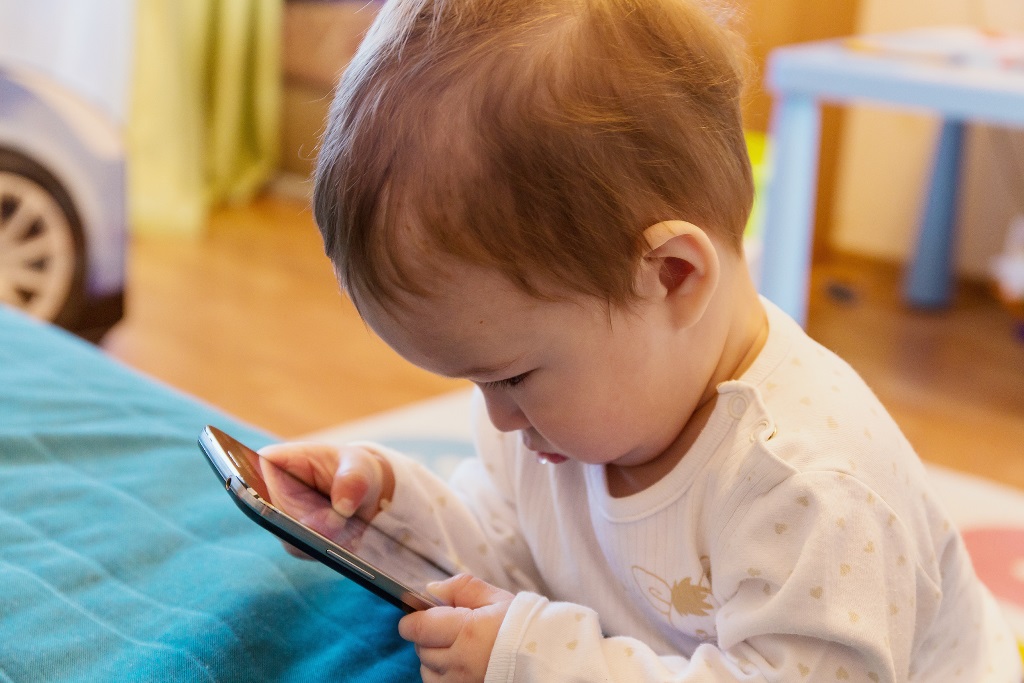- Study Says Most Parents Don’t Use Car Seats In Ride Share Vehicles Like Uber
- This 12-Year-Old Boy Is A Sophomore Aerospace Engineering Major!
- Fire Safety Experts Warn Of Hand Sanitizer Danger After A Mom and Kids Escape House Fire
- Recall Alert: Peaches May Be The Cause Of Salmonella Outbreak, 68 People Ill
- Summer Vacation In The Days Of COVID: Tips To Stay Safe
- How To Safely Grocery Shop During The Coronavirus Pandemic
- Michigan Teen With Vape-Related Illness Undergoes Double Lung Transplant
- Teen Kicks Off Anti-Vaping Campaign From Hospital Bed
- Teenager Receives Life Sentence For Strangling Sister To Death Over A Wi-Fi Password
- Toddler Falls To Death From 11th Deck of Cruise Ship
AAP Releases New Guidelines On Screen Time


Technology is a great thing — but at what age is it OK for babies and toddlers to be exposed to gadgets like smartphones and tablets?
Babies Younger Than Two Are Using Smartphones
More than half of babies in low-income households are using smartphones and tablets according to MarketWatch.
Via: marketwatch.com
Parents are probably familiar with the common recommendation by American Academy of Pediatrics (AAP) against all screen time for children ages 2 and younger. The recommendation by APP pointed out that studies have shown that excessive media use can lead to attention problems, school difficulties, sleep and eating disorders, and obesity. In addition, the Internet and cell phones can provide platforms for illicit and risky behaviors. The AAP recommended that parents establish “screen-free” zones at home by making sure there are no televisions, computers or video games in children’s bedrooms, and by turning off the TV during dinner.
However, the AAP has recently reconsidered this extreme screen-time ban for toddlers and babies.
In a news release announced September 2015, the AAP offered more practical advice to moms and dads who are attempting to navigate this whole parenting gig in our tech-immersed culture:
- Media is only another environment. Media can have both positive and negative effects on children, just like any environment.
- Parents need to be role models. By limiting your own media use and by modeling polite online behavior, parents can teach children how to use technology in a healthy way.
- We learn from each other. “Talk time” between parents and children is still extremely important for developing language. This is is because very young kids learn the best through two-way communication — and not passively watching videos. Neuroscience research shows that very young children learn best via two-way communication. “Talk time” between caregiver and child remains critical for language development.
- Quality content makes a difference. Make sure the content your little one is consuming is high quality/educational. This is far more important than just setting a timer and letting children do whatever.
- Family engagement matters. Parents should make it a point to engage with their children during screen time. Play a video game with your child while talking about what is happening. Watch videos/play together with your toddler, instead of just handing over the device and doing something else.
- Regular playtime is still important. Parents need to make sure children have daily playtime away from screens and gadgets. This unstructured playtime promotes creativity.
For more details on the AAP’s updated recommendations concerning screen time, click here for the full article.








0 comments